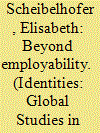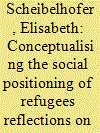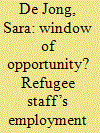| Srl | Item |
| 1 |
ID:
165696


|
|
|
|
|
| Summary/Abstract |
The so-called “refugee crisis“ put forced migration to the core of Europe in a way not seen for years. Since then, a plethora of unsolved global issues which have effects on more privileged nation-states in the global North has once again came to the fore. This is especially true for the EU member states who may hardly be conceived as unitary in confronting the challenges forced migration implies for nation-states. The so-called ”receiving countries” have often set aside the humanitarian aspect of granting asylum. From their point of view, there is an increased economic interest in refugees with higher formal qualifications and work experience, who could be integrated comparatively easily into the national work forces without further investments. At the same time, such refugees would also serve national economic interests by strengthening qualified labor. Compared to earlier years of reception, several parts of Europe have thus encountered another period of numerous arriving and at least temporarily resident refugees.
|
|
|
|
|
|
|
|
|
|
|
|
|
|
|
|
| 2 |
ID:
165698


|
|
|
|
|
| Summary/Abstract |
Presently, European and other countries are facing public (and scholarly) discussions surrounding the possibilities of successfully integrating refugees into their respective national labour markets. Such debates often disregard the complex circumstances under which refugees are received in a given nation-state. For this conceptually oriented article, we draw on the example of Austria as a receiving state, as it shares many characteristics with other receiving nation-states in the global north. Theoretically, we base our argument on the assumption that societies are socially unequal. Such inequality is institutionally co-constructed, as we will show in this article. Yet empirical examples assist in understanding how refugees are also actors who are not only exposed to such institutional and varying social environments. Rather, they also reinforce and/or change these circumstances by their own agency.
|
|
|
|
|
|
|
|
|
|
|
|
|
|
|
|
| 3 |
ID:
165697


|
|
|
|
|
| Summary/Abstract |
Restrictive policies in Europe are accompanied by exclusionary discourses concerning national citizenship for immigrants, depicting them dichotomously as either ‘deserving’ or ‘undeserving’. In our analysis of immigration and integration policies in Belgium, we focus on how these political discourses interact to differentiate between categories of immigrants who are included or excluded to some extent in ways that are more complex than the dichotomy suggests. We conduct framing and category analyses of migration and integration policies to reveal a discursive field consisting of four central frames that generate seven categories of immigrants with varying degrees of deservingness. Instead of a linear path towards citizenship, migrants are trapped in a labyrinth. We reveal four important contradictions in the policy discourse, leading to the conclusion that permanently probationary citizenship status is the highest attainable goal for certain immigrants. Finally, we discuss the implications of this labyrinth for the socioeconomic position of immigrants.
|
|
|
|
|
|
|
|
|
|
|
|
|
|
|
|
| 4 |
ID:
165699


|
|
|
|
|
| Summary/Abstract |
Employment is considered the primary sphere of social recognition. However, for refugees this source is often unavailable due to phases of unemployment and deskilling. This article explores practices for sustaining a desirable status and recognition via alternative spheres by analysing Chechen refugees’ interpretations of their employment trajectories, taking into account their status in the region of origin, where many had to abandon employment and education. After this first biographic caesura, they perceive ‘enforced idleness’ during the asylum procedure as a second fracture. Accommodation centres in remote areas and exclusion from the labour market bring about homogeneity of their networks. Positioning themselves as a ‘refugee subject’ becomes central for the rebuilding of identity and for narrating the redirection of career paths. The results, based on interviews in combination with network drawings, reconstruct how refugees make use of their contacts for job-seeking and embedding disruptive life events.
|
|
|
|
|
|
|
|
|
|
|
|
|
|
|
|
| 5 |
ID:
165702


|
|
|
|
|
| Summary/Abstract |
For super-diversity to describe the diversification of Asian global cities, it should be discussed with reference to existing regimes governing diversity. In Singapore, the postcolonial state instituted the multiracialism of equality between the ‘races’ of colonial governmentality, so as to manage the ethnic diversity of ‘the plural society’. However, contemporary immigrations disrupted this multiracialism. The political response focused on managing the mobilities of low-wage migrant workers. Drawing on my research on urban change, I show that the this led to the bio-political management of migrant worker mobilities and articulation of the discourse of needs. I argue that the 2013 riot by migrant workers accelerated the production of dormitory space to exclude migrant workers from access to the city and reproduce their physical needs. The case of Singapore shows that we need to ‘moor’ the understanding of super-diversity in Asian global cities to the postcolonial management of diversity and migration.
|
|
|
|
|
|
|
|
|
|
|
|
|
|
|
|
| 6 |
ID:
165700


|
|
|
|
|
| Summary/Abstract |
This article presents an analysis of employment trajectories of refugee staff in migrant support and advocacy organisations in the UK, Austria and the Netherlands. In contrast to existing scholarship, it takes refugees’ success in finding employment as a starting point. Moreover, it makes an important contribution to extant literature by identifying the unique features of a niche employment sector for refugees: migrant support organisations. I demonstrate that the mainstream explanatory concepts of ‘labour market segmentation’ and ‘ethnic niche’ fail to capture refugees’ pathway from client to service provider and neglect the sector’s status as a mid- to high-skilled but feminised employment sector. I propose instead to understand ‘refugeeness’ as a form of capital and argue that this capital provides access to employment in migrant support and advocacy organisations, while simultaneously trapping refugees in front-line work with high degrees of hidden, devalued labour and inadequate career mobility.
|
|
|
|
|
|
|
|
|
|
|
|
|
|
|
|
| 7 |
ID:
165701


|
|
|
|
|
| Summary/Abstract |
The contribution introduces the concept of ‘organised disintegration’. Based on an interview study conducted in Germany, the concept describes the life situation of asylum seekers and ‘tolerated’ refugees. At first, the theoretical references to the ‘total institution’ and ‘conduct of everyday life’ approaches are explained. ‘Work’ appears in the results as an arrangement of the refugees’ conduct of everyday life that is characterised by joblessness and futile search for employment. The refugees experience work as prohibited and their persistent situation as lost lifetime and as ‘human death’. At the same time, the arrangement of work is maintained as a meaningful part of ‘real life’ which begins immediately after overcoming the current legal status. The validity of the concepts that were made relevant as well as the implications for the current state of research in refugee studies are discussed in the conclusion.
|
|
|
|
|
|
|
|
|
|
|
|
|
|
|
|